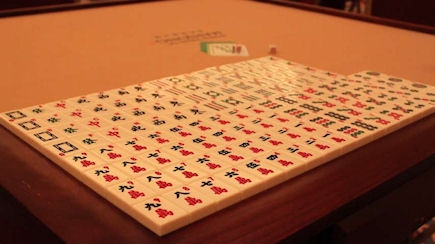This article first appeared in the Sep/Oct 2010 issue of World Gaming magazine.
If you were lucky enough to be at the Venetian in late August you might have witnessed a wonderful part of Asian culture making history as the 2010 World Series of Mahjong took over the casino.
The Venetian casino in Macau is gigantic. From singing gondola rides to some of the best brand name shopping around this is a hive of entertainment. This is before you even contemplate the 3,000-room hotel and a gaming floor that would make most other casinos blush. From August 19 to 22 the Venetian hosted the third World Series of Mahjong (WSOM) and the World Gaming team was there to both cover the tournament and try our best to take home the title. We were on the floor (our own Gemma Collinge was a judge for the Riichi event), we were in the game (there was a nine player strong WGM pro Mahjong team playing the main event) and we set about covering the biggest Mahjong tournament in the world with photos and interviews.
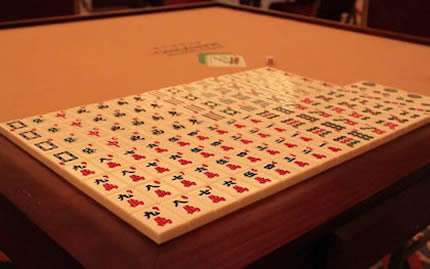
Entering the WSOM room was like being transported to Mahjong heaven. Fifty-one precisely square tables lined up in rows and split into sections, with four chairs each, a stage with an automatic table set up on it and of course 136 white tiles on each table. For four days, hundreds of people from all over the world joined together to celebrate one of Asia’s favourite pastimes as Mahjong took centre stage.
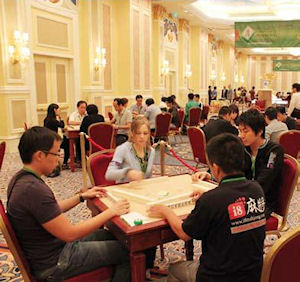
August 19 was the date for event number one, the US$1,000 Riichi Tournament. The field was small, but there was a strong contingent of Japan’s best players who made it over to Macau searching for the Riichi world title. Among them was Saori Azuma from the Japan Professional Mahjong League (JPML). She was one of the players that won an all-expenses paid trip to Macau through a ReachMahjong.com satellite in Tokyo. Azuma finished in third place. Adding to his impressive list of achievements, JPML’s own Garthe Nelson was the runner-up. Garthe is a seasoned champion who placed 15th in the 2008 WSOM main event. The big winner was Fumitaka Tanaka who won nearly HK$40,000 and more importantly etched his name into the history books.
The World Gaming Pro Mahjong Team
World Gaming magazine are proud supporters of mahjong and in particular the World Series of Mahjong so we fielded our own team of nine players to take on the world’s best in the main event. Let’s introduce you to the team.

Jenn Barr – USA (captain)
- Japan Professional Mahjong League – Grade 2
- ReachMahjong.com co-founder
- World Gaming magazine Columnist
“This will be my third time participating in as many WSOM events. I just want to play my game, get enough rest, and not get too excited about things. I can’t wait to try out the new structure and see how it affects strategy and play.”

Garthe Nelson – USA
- Japan Professional Mahjong League – Grade 3
- ReachMahjong.com co-founder
“It’s exciting to be part of a team with such big names. So far I’m top dog at the WSOM (for our team) and I will be happy with nothing less than an improvement on my 15th place finish from two years ago. A World Gaming final table would be awesome! Go team!”

Gemma Collinge – UK
- ReachMahjong.com co-founder
- 2009 German Riichi Open Champion
“When I played in the last WSOM I was still only a beginner. I’ve now spent two years practicing and I hope to do much better this time! Anywhere in the top 50 percent would be fantastic.”

Kelvin Ng – Hong Kong
- World Gaming magazine columnist
- JMD Forum moderator
“This year we have the third WSOM, players will be much more familiar with the Zhung Yung rule-set, and they are improving. So the level of the tournament will be the highest in its history. I am looking forward to good matches for the event this year.”

Ryuichi Masuda – Japan
- Japan Professional Mahjong League – Grade 4
“Mahjong started in China and found its identity in Japan. I’m glad that we can play with people from the country the game started in and show them our skills. For the past 10 years, all of my adult life, I have made my living as a professional Mahjong player and I want to show those skills in Macau.”

Shintaro Konno – Japan
- Japan Professional Mahjong League – Grade 5
- ReachMahjong.com columnist
“It’s been a while since I’ve played these rules so it will be tough, but I definitely want to bring some prize money back to Japan.”

Yuko Ito – Japan
- Japan Professional Mahjong League – Vice-President
- Japan Professional Mahjong League – Grade 9
- 9th Annual JPML Phoenix Cup Champion
- 3rd Annual Saikyou Champion
- 6th Annual Janma-King Champion
- 7th Annual Ryuou Champion
- 4th Annual All Japan Mahjong Pro/Amateur Masters Champion
- 6th Annual All Japan Mahjong Pro/Amateur Masters Champion
“Our team can’t lose! Even if we can’t win the whole thing, I hope at least one of us will make it to the final table and protect our professional pride.”

Gigi Suen – Hong Kong
- Formerly worked in public relations for the World Series of Mahjong
- Now plays Mahjong for the WGM/RM pro Mahjong team

Yasumi Inada – Japan
- Works in Japanese media and appears on television
- Won her way into the Riichi event at the WSOM
- Learned Mahjong by playing Konami’s Mahjong Fight Club
The Main Event
The main event started on August 20 and was set for three days. The World Series of Poker has grown to one of the biggest sporting events in the world and it all started from humble beginnings. Considering how many players turned up for what was after all only the third World Series of Mahjong, and how many people actually play Mahjong worldwide, then this tournament could well eclipse its poker equivalent in the future. Winning this tournament means you can call yourself the World Champion of Mahjong for an entire year!
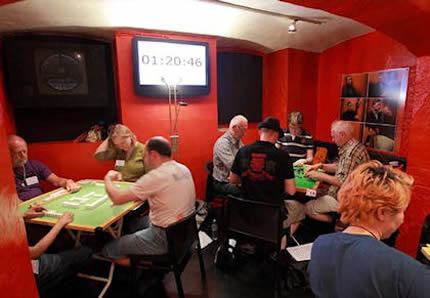
The big change in the WSOM this year was the prize structure. Besides pushing the entry fee down to US$500, from US$5,000 previously, the entire prize distribution changed. The prize pool consisted of HK$1,000,000, which was split into four $250,000 paying rounds. The first round was six sessions over two days with three games in each session. With a brand new structure in 2010, this year all 200 players played for the entire first two days. The top sixteen players from this round advanced to the third day and the next paying round. In past years half of the participants were eliminated in each round, resulting in eliminations starting on day one. Most of the players liked the new system, but some big losers on the first day didn’t bother to show up for the second, giving some trouble to the organisers in terms of table-draws.
In the second playing round, any players that dropped below negative 250 points (any player that lost one or two big hands) was not eligible for the prize money in that paying round. The top eight players from the second paying round advanced to the semi-finals where another $250,000 HKD was awarded. The final four played out the final table and another $250,000 was awarded to these players as well.
In past years the prize was decided for each place beforehand, giving the 17th to 32nd place finishers nothing but their entry fee back. This year, each in-the-money player’s payout was based on the amount of points that they ended with (which is calculated by the sum of square root of raw scores in all six preliminary rounds). That means that the WSOM started out as a tournament, but ended up more like a cash game. This all sounds a little confusing but the WSOM is relatively new, and there will always be a few teething problems along the way.
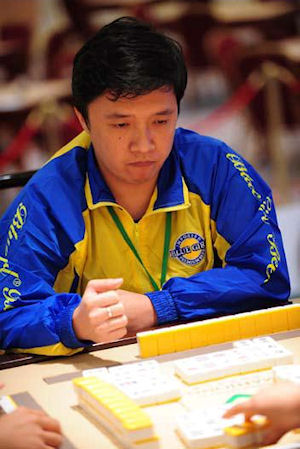
Chan Tak-Kwan, the 2010 WSOM World Champion
The World Gaming and ReachMahjong.com team fared extremely well. JPML Pro Shintaro Konno placed 20th for HK$7,068, Gigi Suen of Hong Kong took 19th place for HK$7,500. Ourselves, Jenn Barr and Kelvin ‘Puyo’ Ng, both made the final sixteen for cash prizes of HK$8,293 and HK$15,480 respectively. On top of that, friend of WGM and JPML pro Makoto Sawazaki of Japan made it to the final eight with a WGM patch on all the way for a cash prize of about HK$50,000. Given there were around 200 in the tournament, to have four out of our team of nine finish in the top 20 is something to be proud of.
The winner was Chan Tak-Kwan of Hong Kong and he took home HK$180,530. This was an incredible effort and he becomes the third official World Champion. We all had a great time playing and covering the event and we can’t wait until next year when we can all come back and do it again.

